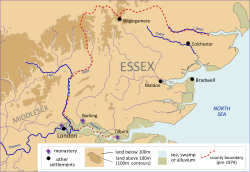Kingdom of the East Saxons | |||||||||
|---|---|---|---|---|---|---|---|---|---|
| 527–825 | |||||||||
 | |||||||||
| Status | Independent kingdom (527–709) Client state of Mercia (709–825) | ||||||||
| Official languages | Old English | ||||||||
| Religion | Paganism (before 7th century) Christianity (after 7th century) | ||||||||
| Government | Monarchy | ||||||||
| King | |||||||||
• 527–587 | Æscwine (first) | ||||||||
• 798–825 | Sigered (last) | ||||||||
| Legislature | Witenagemot | ||||||||
| Historical era | Heptarchy | ||||||||
• Established | 527 | ||||||||
• Full integration into crown of Wessex | 825 | ||||||||
| Currency | Sceat | ||||||||
| |||||||||
The Kingdom of the East Saxons (Old English: Ēastseaxna rīce; Latin: Regnum Orientalium Saxonum), referred to as the Kingdom of Essex /ˈɛsɪks/, was one of the seven traditional kingdoms of the Anglo-Saxon Heptarchy.[a] It was founded in the 6th century and covered the territory later occupied by the counties of Essex, Middlesex, much of Hertfordshire and (for a short while) west Kent. The last king of Essex was Sigered of Essex, who in 825 ceded the kingdom to Ecgberht, King of Wessex.
Cite error: There are <ref group=lower-alpha> tags or {{efn}} templates on this page, but the references will not show without a {{reflist|group=lower-alpha}} template or {{notelist}} template (see the help page).